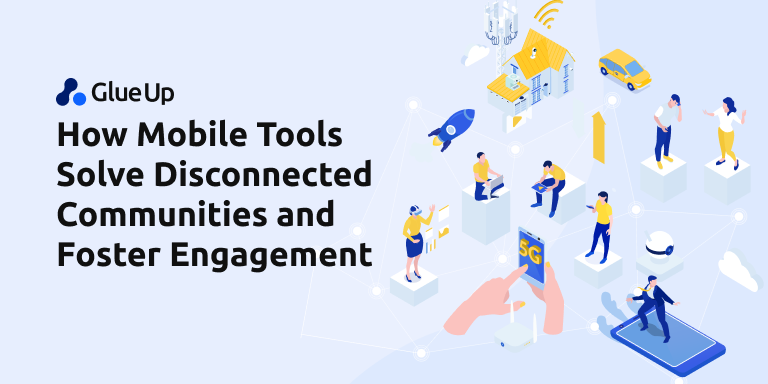
Building a strong and stable community requires a great deal of effort and commitment. This is particularly true for online communities, where digital burnout is common and interactions feel restricted owing to their virtual nature.
To help member organizations navigate through this digital ocean, Glue Up hosted an online panel discussion on March 15, 2023. The event brought together leading industry figures in the APAC region to share key strategies for moderating and managing online communities.
For those who missed the event and are looking ahead to building a thriving community through effective moderation and management strategies, here are some key takeaways for you.
Also, be sure to check out our upcoming events for insights from our top-level industry and association leaders.
Create Reasons to Stay Engaged
“When people arrive at an online platform, they expect to find something exciting and interesting that can capture their attention. And you'll find that if you haven't got something exciting, very quick, or very early, then people will go and they won't come back.”

Glenn Robinson, General Manager of Albury Business Connect
Enforce Clear Guidelines
“Setting the right tone is very important from the beginning. For example, a code of conduct that outlines expectations for respectful communication and appropriate conduct can help set the tone for the community and promote a safe and inclusive environment for all members.”

Dr. Joon-Nie Lau, Deputy CEO of Singapore International Mediation Centre
"By setting clear boundaries and consequences for inappropriate behavior, online communities can foster a culture of respect and accountability, creating a positive and safe environment for all members."

Theresa Hudzinski, President at Professional Women’s Society (PWS)
Find the Right Contributors
“To create a magnetic reason for people to contribute, one needs to have a topic or someone that is already engaging with an audience. Therefore, stealing that audience and bringing them to you is an effective way to build a successful online community."

Glenn Robinson, General Manager of Albury Business Connect
“The first step in building an online community is to identify key influencers who are respected and can drive conversations. It is important to engage with them before any major event or conversation and get them to share your content.”

Dr. Joon-Nie Lau, Deputy CEO of Singapore International Mediation Centre
“Find passionate and militant experts who have a following and can bring their people with them. This helps in getting a free hit with regard to other people and can play into your favor if done right. However, it is important to remember that building a profile and community requires a lot of effort and research, and it is not something incidental.”

Glenn Robinson, General Manager of Albury Business Connect
Think about Content Extensions
“As events start to come back in person and less time is devoted to social media and online platforms, it is important to think about content extensions. This can include posting online after the event and generating further conversations based on the content that has already been shared. It is also important to create a sense of fear of missing out by highlighting hot topics and inviting people to share their opinions.”

Dr. Joon-Nie Lau, Deputy CEO of Singapore International Mediation Centre
"Success means certain things, those measured differently for everybody. For us, success looks like getting back into face-to-face meetings, using our online platforms to engage, and having a smaller community where we can have offline conversations. It's a lot of managing that piece of it. You need to give time for your content to grow, however, you need to avoid pointless content and, moreover, not flooding the feeds."

Theresa Hudzinski, President at Professional Women’s Society (PWS)
Balance Leadership and Feedback
“Balancing leadership and feedback is critical in building and maintaining healthy online communities. This is particularly relevant for professional communities and NGOs where members are expected to adhere to certain standards.”

Dr. Scarlett Mattoli, Clinical Psychologist at The Psynamo Group
"I've always found the key to it is setting up some rules early, enforcing those rules, and demonstrating and being on top of when those rules are broken. If you want the group to behave, and you want to show leadership and you want those, all those things to play out the way you want them to, first of all, and that's the standard you set for your community.”

Glenn Robinson, General Manager of Albury Business Connect
“The process of balancing leadership and feedback is arduous and can lead to burnout. To avoid this, leaders can rotate roles and responsibilities within the community. This ensures that the workload is shared among members, reducing the likelihood of burnout.”

Dr. Scarlett Mattoli, Clinical Psychologist at The Psynamo Group
Personalize Connections
“To ensure the stability of a community, I believe in making connections rather than having followers. By personally selecting people to invite into our network, we build relationships with them, which helps to create a sense of community and keeps members coming back.”

Dr. Mary Joy Abueg, President at National ICT Confederation of the Philippines
"Success in community building is not just about the number of members, but also the quality of engagement. While there may not be a fixed frequency for posting, it is important to know your audience and post content that resonates with them. Additionally, having influential members engage in conversations can also drive engagement."

Theresa Hudzinski, President at Professional Women’s Society (PWS)
Be Aware of Your Members' Preferences
"Trying everything doesn't always work, as different members have different preferences. It's important to acknowledge that and program events accordingly. For instance, some members may not like online interactions and would much rather prefer in-person events. Understanding your members' preferences and demographics can help you tailor events that work best for them."

Dr. Joon-Nie Lau, Deputy CEO of Singapore International Mediation Centre
"Aside from the benefits of having moderators for your group, I believe that the audience and community are also valuable resources that should not be overlooked. Tapping into their expertise and knowledge by inviting them to share data and take turns in moderating the group can lead to amazing results”

Dr. Scarlett Mattoli, Clinical Psychologist at The Psynamo Group
Have a Growth Mindset
"To build a successful online community, it is important to have a growth mindset and be willing to experiment. There is no one-size-fits-all approach, and what works for one community may not work for another. However, by focusing on quality engagement, knowing your audience, and being open to trying new things, you can increase the chances of success."

Dr. Joon-Nie Lau, Deputy CEO of Singapore International Mediation Centre
Choose the Right Digital Platform
"Choose the right platform based on your target audience and the unique value you can offer. Whether it's for a professional or younger generation, check the statistics of their preferred platforms. Solving the problem starts with identifying the right generation and offering value to them."

Dr. Mary Joy Abueg, President at National ICT Confederation of the Philippines
There is no doubt that building an online community is a challenging task. It requires a clear vision, a commitment to engagement and participation, and ongoing effort and investment. Still, with the right content, timing, and engagement, you can create a safe, inclusive, and thriving environment that supports the goals and interests of its members.
To provide member organizations with a secure digital experience, Glue Up offers community management software with advanced moderation and engagement features. Find out more about this private digital community by getting a demo here.



